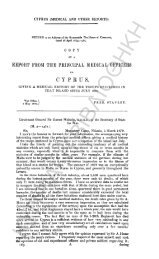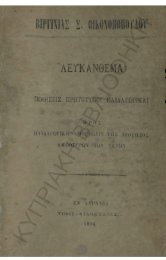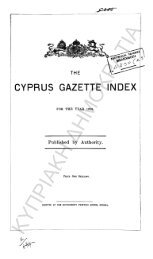THE CYPRUS GAZETTE
THE CYPRUS GAZETTE
THE CYPRUS GAZETTE
- No tags were found...
Create successful ePaper yourself
Turn your PDF publications into a flip-book with our unique Google optimized e-Paper software.
<strong>THE</strong> <strong>CYPRUS</strong> <strong>GAZETTE</strong> (EXTRAORDINARY), llth JUNE, 1918.As regards the weighing we cannot deal with many of the complaintsfor the reason given above.It seems true that an excessive amoimt is deducted for tare, and that inweighing carobs fractions of a htre in each sack are not weighed. This isunjust to the farmers who sell, but it is so generally and openly done that wecannot think the merchants intend to do more than to enforce what hasbecome the practice without due appreciation of its injustice. Examinationalso showed that the merchants' weighing machines were untrustworthy,p. Among 36 machines (kantars) examined 8 were found to be faulty, and allthe errors were in favour of the merchant.Some of the witnesses seemed to have great distrust of the Municipalweighers. For the reasons given above we express no opinion as to whetherthere is any ground for such distrust. The only thing we can say is that theilliterate villager has no check on the weigher and naturally becomes suspicious.He does not know whether the weight called is the weight recordedby the weighing macliine, or whether the weight entered in the book is theweight called. He naturally becomes suspicious.Every one, merchants and others, agreed that the present system ofmeasuring by the kilo, and weighing by the kantar is unsatisfactory. Theresult is generaUy to the advantage of the employer of the man who measuresor weighs. Merchants apparently estimate for a surplus of 2J% in theamount weighed out of their stores over the amount weighed in. It wasalleged that the same thing occurs in the Government granaries. If thatis so, it is evident it must be the result of some cause other than intentionalwrong doing.(2). As regards the price, it seems that it is fixed by the merchant whenthe account is struck between the parties when there is no express contractas to price. There can be no bargaining because the farmer is bound todeliver his produce. There is no check on the merchant as regards theprice he will fix.(3). As regards interest there is strong evidence that the village moneylenders do charge frequently excessive interest. Some of them admitcharging 3/- and 4/- in the £1. Others as shown by contracts charge verymuch more. It is disguised in various ways. Sometimes a moderate interestis charged and a large commission for getting the loan. Sometimes the loanis treated as a payment in advance for produce, which is to be dehvered at aprice below market price, so that the money lender wiU obtain interest muchin excess of what is allowed by the law. The interest charged in kind is insome parts over 50%. It is unnecessary to deal at greater length with amatter which appears to be common knowledge.When the farmer and merchant settle their account the farmer appears,from the evidence, to have cause for complaint. The farmer keeps no account.From some of the evidence it seems that he is discouraged by the merchantwhen he makes enquiries as to the state of his account. When, as is usual,at a certain time of the year, the merchant makes up the account with thefarmer, the farmer has to take the merchant's word as to the details of theaccount. It would appear, moreover, that the farmer suffers from the wayin which the account is made up.The account is taken in the following way :—The merchant is debitedwith the value of the produce dehvered to him by the farmer duringthe previous year. The merchant is credited with money advanced byhim and value of the goods supphed by him to the farmer plus 12%interest from the date of the advance of the money or the supply ofthe goods to the date when the account is taken. Sometimes the merchanttakes a bond for money advanced and exacts 12% on the amount of thebond as interest in advance for a year. In spite of this, however, thewhole amount of the bond is credited to the merchant when the accountis taken, although the bond may only have run 2 or 3 months. No allowanceis made for the unexpired part of a year for which the bond has to run.ΚΥΠΡΙΑΚΗ ΔΗΜΟΚΡΑΤΙΑizacomprint as'^
















